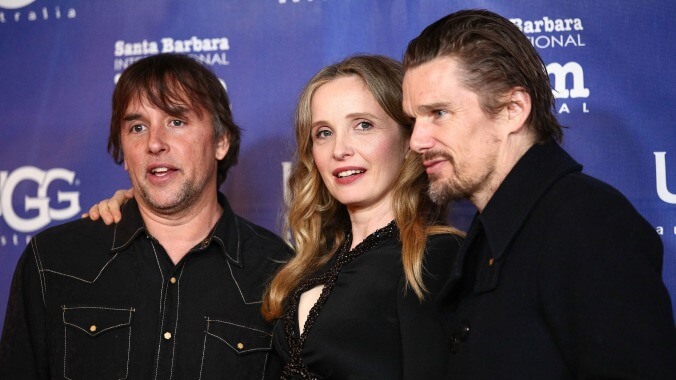Richard Linklater, Julie Delpy, and Ethan Hawke at the Before Midnight premiere Photo: Imeh Akpanudosen
It wasn’t much of a surprise recently when actress and filmmaker Julie Delpy revealed she was paid “maybe a tenth” of what Ethan Hawke was for 1995's beloved Before Sunrise, a two-hander that spawned one of film’s most unlikely franchises (Before Sunset and Before Midnight are just as good). Not only is gender pay disparity an ongoing problem in the industry—heavyweights like Michelle Williams and Claire Foy are still dealing with it—but, in 1995, Hawke was an A-lister while Delpy was just breaking into the U.S. industry, and, well, business is business. “Maybe a tenth,” though? That’s bullshit no matter how you spin it, especially considering the weight of her role.
But it’s that kind of context that director Richard Linklater discusses in his response to Delpy’s comments, but not before addressing that “gender pay inequality is a huge issue in our society and every employer and lawmaker should be doing everything they possibly can to correct flagrant examples of discrimination that should have been resolved a generation or two ago.”
In the case of Before Sunrise, though, Linklater notes that, with a total budget of $2.7 million, no one was getting paid much of anything. “Salaries are negotiated by agents behind the scenes on behalf of their clients, and Ethan Hawke did get paid a little more than Julie Delpy on the first two of these films,” he says. “No one involved in the productions considered this an injustice in 1994 because Julie was just getting established in the U.S. while Ethan was one of the biggest stars in his age range, getting offered seemingly every project in the industry.”
In her interview, Delpy says she wouldn’t have done Before Midnight if she wasn’t paid the same rate as her co-star. Linklater, however, says that “it was obvious that everyone should be paid the same” by that point. “I don’t remember it even being an issue—it was just something we three agreed upon, with no conflict or theatrics. I don’t doubt that Julie was determined to receive equal pay for Before Midnight, I just want to be clear that she did not have to negotiate or demand it and that she was never offered anything less.”
Linklater adds that while there’s no doubt industry compensation is an issue in the world of low-budget indies like Before Sunrise, “the most glaring examples” exist in the realm of big-budget projects. “[I]t’s up to everyone to do everything they can to demand transparency and this long-overdue equality at whatever level they find themselves.”
Read his full statement below.
Make no mistake, gender pay inequality is a huge issue in our society and every employer and lawmaker should be doing everything they possibly can to correct flagrant examples of discrimination that should have been resolved a generation or two ago. I’d be surprised if the Before Trilogy will end up qualifying as an example of this in our particular industry though. First off, these films we’ve been so lucky to even get made fall squarely in the indie/low-budget/labor-of-love category. The first two were budgeted at 2.7 million—nobody was getting paid much at all! Salaries are negotiated by agents behind the scenes on behalf of their clients, and Ethan Hawke did get paid a little more than Julie Delpy on the first two of these films. No one involved in the productions considered this an injustice in 1994 because Julie was just getting established in the U.S. while Ethan was one of the biggest stars in his age range, getting offered seemingly every project in the industry. It’s likely the trilogy would not exist if Ethan didn’t choose to come to Vienna that summer and work for a fraction of what he could have been making on another project. That’s Ethan—an artist, not a businessman, a guy who’s turned down millions many times over because he was following his artistic impulses rather than careerist or material ones. He’s made a career of this, time and time again coming aboard indie films for little to no money—it’s really admirable and a great example for performing artists who are serious about their art. There were similar dynamics on the first two films as far as pay goes, but, because our artistic partnership had developed to such a degree, by the time we were making a third, a full 18 years after the first, it was obvious that everyone should be paid the same (again, we’re not talking much money), regardless of industry status. I don’t remember it even being an issue—it was just something we three agreed upon, with no conflict or theatrics. I don’t doubt that Julie was determined to receive equal pay for Before Midnight, I just want to be clear that she did not have to negotiate or demand it and that she was never offered anything less.
How the industry compensates artists is always vulgar and not based on actual WORTH—we all know that. Life isn’t fair, and neither is Hollywood, but it seems that while the most glaring examples of gender pay inequality exist in the more commercial undertakings, it’s up to everyone to do everything they can to demand transparency and this long-overdue equality at whatever level they find themselves.
[via Indiewire]

